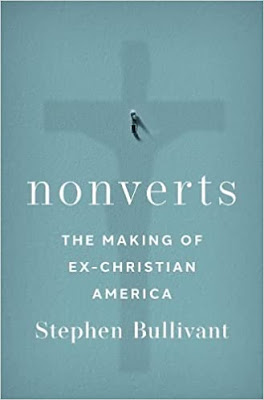But this goes even further. It's not just that the Nones aren't becoming atheists. The Nones also want to put some distance between themselves and atheists. There is an assumption among the Nones that atheists are online trolls, mean-spirited, unpleasant, and fanatical. Even irrational. Which is a fascinating development, that atheism, which prides itself as being "rational," is now associated among many Nones as being quite the opposite.
Much of this is the, perhaps predictable, backlash against the New Atheist moment, when atheists took to the Internet to troll and belittle people of faith. In the early days of this blog I dealt with such types. They are still out there and still show up in the comments, but they seem less prevalent today. It didn't help, I'm sure, that the leader of the New Atheist movement, Richard Dawkins, is an unpleasant person. Or that Sam Harris, another New Atheist leader, started writing faith-adjacent books. The "end of faith" sure didn't last very long.
Bullivant describes the impressions the Nones have regarding online atheism:
A great many nones or near-nones, and indeed a good chunk of self-identifying atheists themselves, [are] quick to distance themselves from those atheists...The existence of "extremist" atheists [is used] to justify [a] more moderate, open-minded non-religious view.
As one of Bullivant's interviewees, a None, comments:
Bullivant also points to the profusion of headlines in recent years, like "I Had to Walk Away from the Toxic Side of Online Atheism" and "Thank God I'm not a New Atheist." As Bullivant concludes, there is an attempt among the Nones to contrast your "implicit reasonableness with those other atheists." The trend among atheist Nones is, "I'm an atheist, but...", as the speaker goes on to clarify that they are not a troll nor fanatical. They are a "good," "open-minded," and "reasonable" atheist. An atheist that respects people of faith. As Bullivant observes, Christians do this all the time. "I'm a Christian, but..." I'm good, open-minded and reasonable Christian, not like those other Christians.I don't know what the deal is with atheists. I mean, like online, those kinda troll people. I've had problems with those people. They kinda act fanatical, basically. Fanatically oppositional. I don't like extremists. I've hopped in conversations, you know, where they're just mean.


